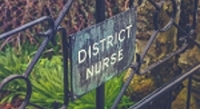T: 01822 851370 E: [email protected]
Visit RSN Survey about life in rural England to find out more.
Spotlight on Rural Health & Social Care - November 2018

This newsletter is provided by the Rural Health Network, part of the Rural Services Network.
It includes a roundup of rural health & social care news, research, learning and best practice.

Rural Hospitals on Knife Crime Frontline
The Guardian reported on the pressures being faced by rural hospitals as a result of the so-called ‘county lines’ drugs trade, which has seen urban gangs moving drugs between cities and smaller towns and rural areas.
Rural Workforce Issues in Health and Care
A report has been launched focusing on Rural Workforce Issues by the National Centre for Rural Health and Care. Prepared by Rose Regneration and the University of Birmingham, it found the main challenges for staffing in rural areas were: disproportionate out-migration of young adults, older than average population and consequently a higher demand for health and social care services.
In addition the report noted that there were fewer NHS staff per head in rural areas and a lack of a rural-specific focus in workforce planning.
There were, however, several opportunities for the future of health care staffing: realising the attractiveness of the NHS as a large employer and using the varied nature of jobs in the NHS to employ a range of people with different backgrounds, for example those without a university degree.
Loneliness GP Strategy announced
On Monday 15th, the Prime Minister launched a cross-Government strategy to tackle loneliness.
As part of the plan GPs will be able to refer patients experiencing loneliness to community activities and voluntary services such as cooking lessons, walking groups and art lessons, known as ‘social prescribing’.
The Government has also partnered with Royal Mail in Liverpool, New Malden and Whitby in a scheme that will see postal workers check up on lonely people in isolated areas during their delivery rounds.
Cautious welcome for social care funding
On Tuesday 2nd of October the Health Secretary announced additional £240m funding for social care. Funding to local authorities will be payable in 2018-19 to help deal with winter pressures. In the statement, the Health Secretary says:
“I am making an extra £240 million available to councils to pay for social care packages this winter to support our NHS”.
RSN want to see the way this is distributed being fair for rural areas where it costs more to deliver services and our ageing population is growing. A long term plan remains essential.
Rural Health and Social Care in the NEWS

Rural Area faces major problem this winter (14 Nov 2018)
Regional chiefs have identified Norfolk as a trouble spot this winter, with local ambulance handover delays described as a “major problem”, according to leaked meeting minutes obtained by HSJ.
NHS England regional director Paul Watson told a risk summit follow-up meeting for the local ambulance trust he “felt there was a need to develop a specific approach to managing issues in Norfolk to mitigate the risks over winter”. (Health Service Journal - HSJ)
“I feel really bad when I hurt my mum” (13 Nov 2018)
Some doctors in rural areas are having to apply for extra funding in order to diagnose patients with autism, the Royal College of GPs has said. The BBC's Victoria Derbyshire programme has spoken to families with autistic children who are struggling to cope with their violent outbursts. (BBC News)
NHS Tracker: How do your local services perform? (18 Oct 18)
Check NHS cancer, A&E, ops and mental health targets in your area
The NHS is under severe pressure. Rising numbers of patients need hospital care - whether in an accident and emergency department, for cancer treatment or for planned operations and care, such as knee and hip replacements. Growing numbers of people are also reporting they are struggling with their mental health.
For each there are strict targets local services are expected to meet across the UK. But what are the chances of being seen in time where you live? Use the BBC interactive tracker to find out. (BBC Health)
The APPG on Rural Services
 The Rural Services Network provides the Secretariat for the All Party Parliamentary Group on Rural Services. They are currently undertaking an inquiry into the funding of adult social care in the rural context. An interim report is being prepared for the Group ahead of the Government Green Paper on Social Care.
The Rural Services Network provides the Secretariat for the All Party Parliamentary Group on Rural Services. They are currently undertaking an inquiry into the funding of adult social care in the rural context. An interim report is being prepared for the Group ahead of the Government Green Paper on Social Care.
Bipolar UK – Rural Loneliness
 Bipolar UK is one of the members of the Rural Services Network and form a part of the Rural Services Partnership. In August 2018 they surveyed their supporters to identify the specific needs of rural and urban communities. A total of 371 people responded, 26% of whom lived in rural communities.
Bipolar UK is one of the members of the Rural Services Network and form a part of the Rural Services Partnership. In August 2018 they surveyed their supporters to identify the specific needs of rural and urban communities. A total of 371 people responded, 26% of whom lived in rural communities.
Bipolar UK found that living in rural communities exacerbated isolation, with respondents more likely to have to travel further for mental health services and being more nervous about meeting new people. They also found 11% were experiencing intense loneliness.
To tackle this isolation, Bipolar UK currently runs 16 peer support group in rural communities. By working with Rural Services Partnership we hope to expand that number, and raise awareness of our other services that can be accessed easily from the home.
Rural Health and Care Alliance
 The new Rural Health & Care Alliance, has been established by the Rural Services Network (RSN) and National Centre for Rural Health & Care (NCRHC) and aims to provide news, information, innovation and best practice to those delivering and interested in rural health and care across England.
The new Rural Health & Care Alliance, has been established by the Rural Services Network (RSN) and National Centre for Rural Health & Care (NCRHC) and aims to provide news, information, innovation and best practice to those delivering and interested in rural health and care across England.
The alliance was launched on 16th October in Parliament, at a time when elderly and vulnerable people living in rural parts of the country are facing a crisis situation in terms of poor access to social care, health services and child social care. This is despite older people making up a significantly higher percentage of the total population in rural areas than in urban ones, and more than one in nine rural people currently providing unpaid care.
The Rural Health & Care Alliance is a membership organisation dedicated to providing news, information, innovation and best practice to those delivering and interested in rural health and care. For more information visit https://rsnonline.org.uk/page/rhca-home or contact [email protected]
Inquiry into Men and Boys Mental Health Launched
 The Women and Equalities Committee launches a new inquiry into the mental health of men and boys Ahead of International Men’s Day (Monday 19 November).
The Women and Equalities Committee launches a new inquiry into the mental health of men and boys Ahead of International Men’s Day (Monday 19 November).
Awareness of the mental health problems affecting men and boys has increased in recent years, and it is recognised as a serious issue:
- According to the Office for National Statistics (ONS), just over three out of four people who take their own lives are men (76%); this is the biggest cause of death for men under 35.
- 5% of men in the UK are suffering from one of the common mental health disorders (ONS).
- Men are three times more likely than women to become alcohol dependent (Health and Social Care Information Centre).
- In a survey conducted for the Men’s Mental Health Forum, 12% of men said that the last time they took time off work to see a GP was because they were “constantly feeling stressed or under pressure” and 11% because of “prolonged feelings of sadness.”
The Committee is inviting written submissions to the inquiry by Monday 18 February 2019 and further information on the questions the inquiry is considering can be found here
How can we build a Rural Health and Care Workforce?
 The NHS tuned 70 on 5 July 2018. This year has seen celebrations and appreciation of the vital role that the service plays. As the NHS ages the pressures and demands it faces are very different to those of 1948 – with the workforce under considerable strain to provide services. How can we plan, fund, recruit, train and retain health and care workers in rural areas that meet people’s (clinical and wellbeing) needs and the (professional/lifestyle) aspirations of staff?
The NHS tuned 70 on 5 July 2018. This year has seen celebrations and appreciation of the vital role that the service plays. As the NHS ages the pressures and demands it faces are very different to those of 1948 – with the workforce under considerable strain to provide services. How can we plan, fund, recruit, train and retain health and care workers in rural areas that meet people’s (clinical and wellbeing) needs and the (professional/lifestyle) aspirations of staff?
Jessica Sellick investigates.
RSN Observatory
 The RSN Observatory provides a statistical overview of rural life. It provides analyses and comment on key service provision and issues affecting rural communities.
The RSN Observatory provides a statistical overview of rural life. It provides analyses and comment on key service provision and issues affecting rural communities.
It includes information on housing, health, the economy and local services.



